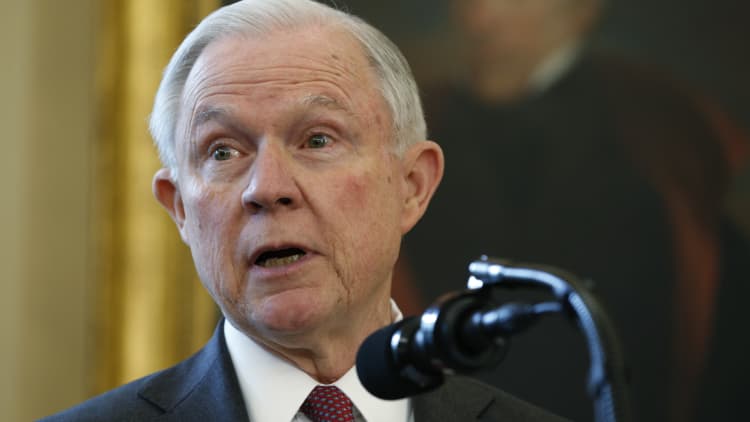
Attorney General Jeff Sessions' recusal leaves any Justice Department investigation of alleged Russian election interference temporarily in the hands of a prosecutor promoted by Barack Obama.
Sessions on Thursday stepped aside from taking any role in federal inquiries into Donald Trump's presidential campaign, including whether officials or surrogates had improper contacts with the Russians. Sessions had a meeting last year in his office with Sergey Kislyak, the Russian ambassador to the United States, which he said was unrelated to the campaign.
That means it's the job of Acting Deputy Attorney General Dana Boente to oversee any investigations related to the presidential campaigns by the FBI or Justice Department attorneys.
Boente — whom Obama promoted to U.S. attorney in Alexandria, Virginia, in 2015 — would give up that authority when and if a permanent deputy is confirmed. The White House has nominated the U.S. attorney in Baltimore, Rod Rosenstein, a Republican veteran of George W. Bush's administration, to the position. His confirmation hearing is scheduled for Tuesday.
Beyond that, the course of any investigation is unclear, and several important questions can't yet be answered.
One of them is what Sessions' announcement actually means.
More from NBC News:
Briefs flood Supreme Court in support of Gavin Grimm
At heart of Russia crisis, Kislyak stays in the shadows
Trump: Sessions' Russia testimony could have been more accurate
Sessions said that he's recusing himself from "any existing or future investigations of any matters related in any way to the campaigns for president of the United States."
The Federal Election Commission categorizes presidential campaigns by campaign cycles, which are generally considered to end on Election Day.
By that strict definition, Sessions could say he's withdrawing from any investigation of alleged impropriety occurring up to and including Nov. 8 — and that he could potentially step back in if an allegation surfaces about anything that may have happened later.
Sessions left the door open for that possibility in an interview on Fox News on Thursday night.
Take, for example, the controversy surrounding Michael Flynn, who resigned as Trump's national security adviser on Feb. 13. NBC News has confirmed that Flynn and Jared Kushner, Trump's son-in-law and adviser, had what was described as a "brief courtesy meeting" with Kislyak in December — after Election Day.
Asked by Fox News host Tucker Carlson whether his recusal applied to investigations of Flynn, Sessions said: "If something else comes up that's not related to the campaign, we would go through the same process — to see if I should not be involved in the case."
So what can the Justice Department do to ensure an independent investigation?
It could appoint an independent special counsel to oversee any inquiries — something Senate Democratic leader Chuck Schumer of New York and many other Democrats urged Boente to do. (Schumer went even further, calling on Sessions to resign.)
Special counsels are appointed only in the most sensitive cases. There hasn't even been one since Pat Fitzgerald wrapped up his investigation of who leaked the identity of CIA operative Valerie Plame during George W. Bush's presidency.
The U.S. Code sets out specific criteria to justify appointing a special counsel. First the attorney general or his or her proxy must determine that a criminal investigation is warranted.
Sessions stressed Thursday that he couldn't confirm or deny that there is any investigation at all.
Second, the attorney general or his or her proxy must determine that it would be a conflict of interest for the department or a U.S. attorney's office to conduct the investigation. Both determinations will now be up to Boente or Resenstein.
During his years in the Senate representing Alabama Sessions made it clear that he believes special counsels should be appointed to avoid even the appearance of a conflict of interest.
As recently as Nov. 5 — three days before the election and more than eight months after he began campaigning for Trump — Sessions co-wrote an editorial column on the Fox News website calling on Loretta Lynch, the attorney general at the time, to appoint a special counsel to investigate Democratic nominee Hillary Clinton's use of a private email server.
"We are concerned about the egregious damage that has been inflicted on two revered government agencies: the Department of Justice and Department of State," Sessions wrote, along with Rudy Giuliani and three other former Justice Department officials.
"You should never politicize criminal investigations or prosecutions," Sessions said in an interview on CNBC the next day. Lynch, he said, "knows who appointed her, and she knows whose pleasure she serves at. So we need an independent person, a person that's not politically connected."
Boente hasn't spoken publicly about the matter, and it's unlikely that he will. Until and unless he or Rosenstein do, the bottom line is that — as Sessions himself said Thursday night in an interview on Fox News — the process "will just have to play out."

